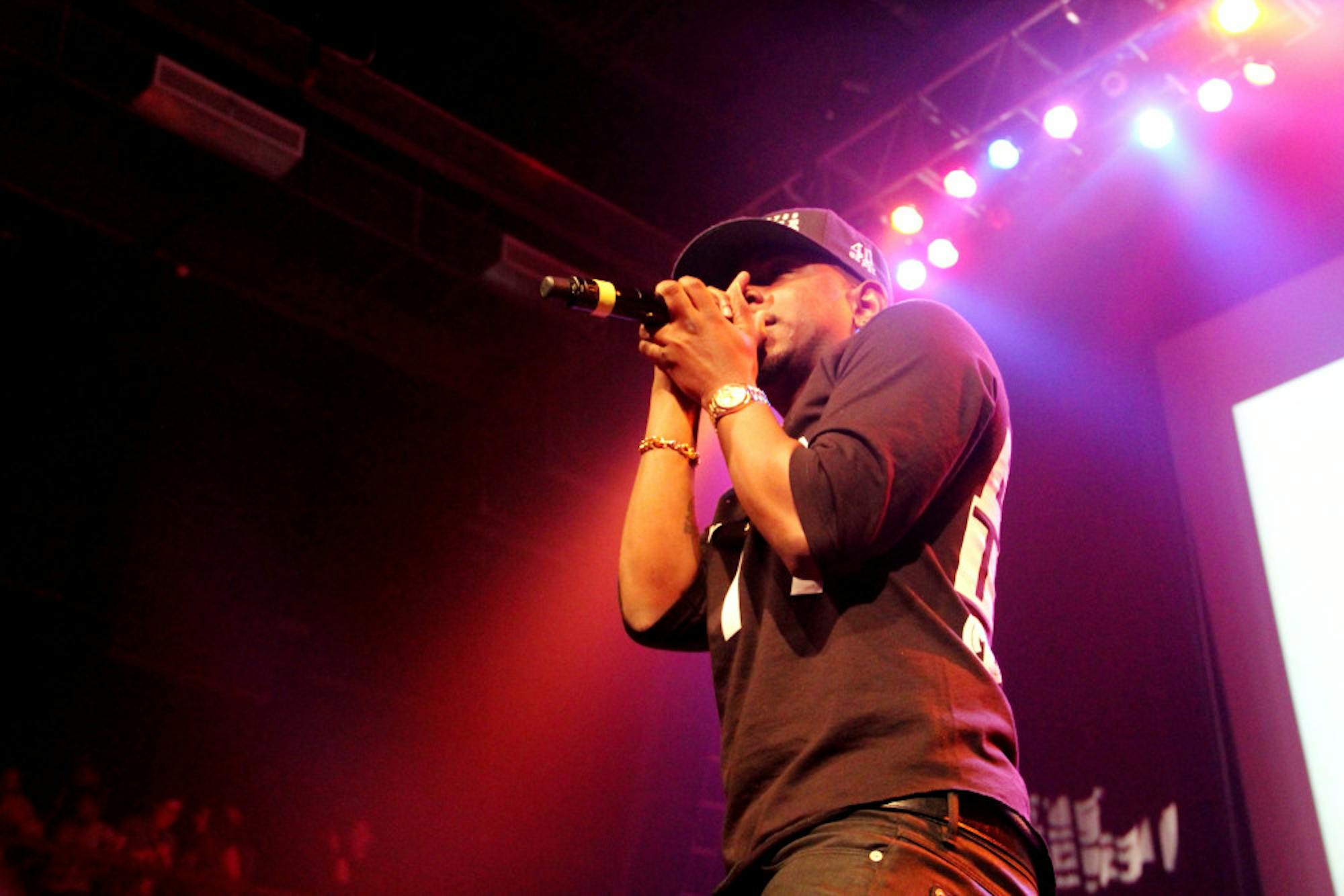“I got a bone to pick” are Kendrick Lamar’s first words on “King Kunta,” and -- now three years removed from his place atop hip-hop’s throne, a seat he held comfortably when his debut album, "good kid, m.A.A.d. city" (2012), was released -- “he mad." Now, he wants his throne back.
America, according to Lamar, has spiraled out of control, with racial injustice, hypocrisy and ignorance threatening the lives of those in a land that is often not free. His “bone to pick” is a double entendre: Kendrick questions the institutionalized racial discrimination against blacks and calls out modern rappers for their misguided messages. “I ain’t stressin’” Kendrick says. He’s hopeful, and that hope manifests itself within giddy, G-funk-style beats. On this funky cut, and on the rest of "To Pimp a Butterfly," Kendrick Lamar acts as the preacher, spitting and singing about the state of hip-hop and black America as he sees it: an America bursting with feelings of anger, sadness and rejuvenation.
"To Pimp a Butterfly" is produced with as much lovely, airy pomp as its title suggests. Lamar’s words lie behind a veil of stylish jazz horns, guitar riffs and piano ballads, and they jump in between verses sporadically. On “Institutionalized,” horns flutter in and out to lighten the mood and heaviness of Kendrick’s lyrics. Snoop Dogg, among others, lends his voice to the track, warning against the power of money, his voice a dry, forlorn whisper.
Meanwhile, “u” starts with Kendrick repeatedly wailing, “loving you is complicated.” Referring to himself in the second person, Kendrick shrieks his anthem, revealing his struggles with self-acceptance. Defeated and sitting alone in a hotel room, Kendrick's persona on "u" is interrupted by a brilliantly jarring transition -- a knock on the door, phrases in Spanish, an unidentified female voice -- and continues with Kendrick moaning in his own drunken, depressed seclusion.
“Alright,” the following track, demonstrates a 180-degree change, picking up the tempo as Kendrick is, as he states, alright again. The repetition of “we gon’ be alright” from Pharrell Williams over a silky, a capella-infused background provides the sole opportunity for head-nodding on the album. Yet each track blossoms on its own, from the slinky horn-filled soundscape on “For Sale? (Interlude)” to the clinking, R&B-friendly vibes on “Momma.”“Hood Politics” attacks American politics and modern rap, as Kendrick shoots holes in society's hypocrisy. He even touches on the uproar surrounding his verse on Big Sean's “Control" (2013), as he raps the lyrics, “It’s funny how one verse can fuck up the game.”“Hood Politics” takes on a funky, ghoulish nature as it develops, and it’s clear that the ghosts of Kendrick’s past, ones entranced by the spoils of his rags-to-riches progression, are haunting his thoughts. Kendrick Lamar is knocking with both hands on the door to hip-hop's "greatest artists ever" discussion. Already a hip-hop icon, Kendrick feels responsible as the voice of his audience; one deeply entrenched in black culture. According to Kendrick, it’s up to him, right now, to live up to that responsibility.
The album’s production fits together “like a box of chocolates,” as Kendrick sings on "Institutionalized." Each song is a truffle filled with unique and unexpected flavors, and the album’s message, dispersed intermittently as poetic interludes, transforms "To Pimp a Butterfly" into a modern masterpiece. Kendrick recites pieces of a poem, breaking up the verses over the first fifteen songs, and repeats the entire poem at the end of the album’s closer, “Mortal Man.” It’s a fitting title, as it reveals Kendrick’s self-awareness; he’s trying to be a man of the people, and pointing out his mortality achieves just that.
Ironically, he draws attention to his humanity by constructing an interview with Tupac made up of old interview clips and Kendrick's own verbal quips, on the first half of “Mortal Man”; the trick that transcends time is something only an immortal Kendrick could pull off.
It’s no coincidence that "To Pimp a Butterfly" was released nearly 20 years to the date after Tupac’s “Me Against the World” (1995) dropped. Kendrick's views seem contrary to “the World’s” opinions. On “The Blacker the Berry,” Kendrick calls himself a hypocrite, and it’s a refreshing point of view, as he holds himself accountable for his anger-filled actions and emotions of his past. “i,” arguably the best track on "To Pimp a Butterfly," is Kendrick’s overwhelmingly-positive message to his audience. At the end of the day, regardless of racial or ideological differences, he and everyone must learn to “love themselves."






